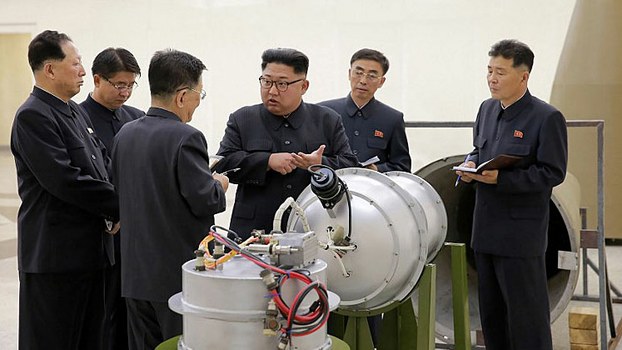




North Korea’s Sept. 3 underground test of a hydrogen bomb left residents of a county bordering China shaken, as buildings collapsed and mirrors and dishes fell from the walls and shelves of private homes, sources in the region said.
North Koreans living in remote towns now fear further damage to nearby structures, a source living in North Hamgyong province told RFA’s Korean Service.
“They feel uneasy about the possible collapse of apartment buildings due to ground-shaking from the nuclear test,” RFA’s source said, speaking on condition of anonymity. “Many of the buildings in this northern area were flimsily built and may not continue to stand.”
On Sept. 4, the day after the test, North Korea’s Central Committee ordered that inspections be carried out both on recently built buildings and on old apartment blocks in the country’s major cities, the source said.
Structures in North Hamgyong’s Hoeryong and Musan cities were especially hard hit, Jiro Ishimaru—a North Korea expert working at the Osaka, Japan-based AsiaPress International—told RFA, adding, “Buildings were shaking as if in an earthquake.”
“Frightened residents fled from their houses because large mirrors and kitchenware were falling from the walls and shelves,” he said.
In some areas near Hoeryong, old residential blocks and buildings under construction completely collapsed, Ishimaru said.
“There must be many victims in the North Hamgyong area. I definitely think there were many people who were hurt.”
No warning given
County residents were even more frightened by the test because they had no advance word that it was coming, Ishimaru said.
“There have been many complaints. They received no notice or warning of the test, so the shaking caused widespread fear. Some even said that this reminded them that the government doesn’t care for people’s lives,” he said.
In China’s three northeastern provinces, frightened residents also fled their homes due to shaking from the Sept. 3 test, sources told RFA.
“I was at a church for Sunday services when I felt a weak shaking,” an ethnic Korean living in China’s Dandong city, across the Yalu river from North Korea, said. “I thought it was an earthquake, though Dandong doesn’t really have earthquakes.”
“Later, I found out that it was caused by North Korea’s sixth nuclear test, which enraged me,” he said.
The bomb detonated by Pyongyang at its Punggye-ri site in North Hamgyong was said by NORSAR, a Norway-based group that monitors nuclear tests, to have been eight times more powerful than the nuclear bomb dropped on Hiroshima in 1945, CNN said in a report.
It was the sixth nuclear test carried out by North Korea since 2006.
Reported by Jung Min Noh, Sunghui Moon, and Joonho Kim for RFA’s Korean Service. Translated by Leejin Jun. Written in English by Richard Finney.